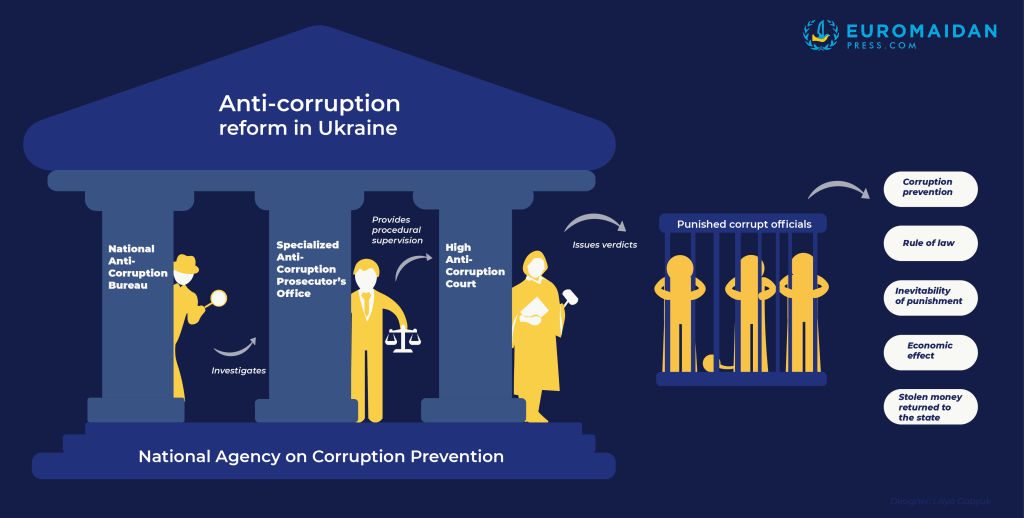The National Anti-Corruption Bureau (NABU) was the first link in the chain of anti-corruption infrastructure after the 2014 Revolution of Dignity. Established in 2015, the role of NABU was to investigate cases of top corruption. For a country that had just experienced a full-on revolution, caused partly by an enormous scale of corruption across all government institutions -- not to mention its own unscrupulous president (Viktor Yanukovych) -- it was important to defend the newly created NABU from possible attacks.
These were predictable, as the revolution itself and the ousting of Yanukovych could not rid Ukraine of all of its corrupt officials, even when many, including the president, had fled its borders. Many others kept their positions. They were elected to local councils and even to Parliament. Fighting corruption was a necessary and critical step after the revolution.
At a time when tectonic changes were taking place and the so-called revanchist forces could not be so bold, the scene was perfect to start the fight. With the participation of civil society and the support of Ukraine’s international partners, the anti-corruption infrastructure was launched.
The foundation of NABU’s independence

The legislation establishing the NABU envisaged guarantees necessary for its independence from other state institutions. Most important was an open competition for the position of bureau director and other employees. The commission responsible for selecting the NABU director was composed of three persons selected and delegated by the President; three persons selected by Parliament, and three by the government.
Probably for modern Ukraine, this was the first transparent procedure for the selection of a key State executive.
“For the first time, particular representatives of civil society took the responsibility for appointing the head of a State body. And all public procedures were created and followed, which had never happened in Ukraine before,” Yuri Butusov, editor-in-chief of censor.net media and a government-delegated member of the commission, said.
According to legislation, the sitting president appoints the bureau director for a period of seven years. The director can only hold the position for one term. The grounds for his dismissal are outlined in detail in the law.
Artem Sytnyk, a lawyer in his mid-thirties, was appointed in 2015 as Director of the Bureau. This is how he addressed the institution he headed after a year of its launch:
"All guarantees of NABU's independence are followed in the law. I will tell you more, such a structure which is registered in our law, is not present in any country of the world. What do I mean? The same anti-corruption bureau in Romania, which is considered successful, does not have an autonomous unit of special operations, operational and technical management, etc. It has only a prosecutor, to whom other services are subordinated. That in our reality would be absolutely impossible. When legislators passed the law on NABU, which was developed with the active participation of our foreign partners, they took into account this nuance and created the NABU as the most autonomous independent structure,” said Sytnyk in an interview with zn.ua a year after his appointment.
He also stated that he and his team are responsible for keeping the NABU.
Ups and downs of NABU’s work

Since 2015, many changes have occurred in the country, to NABU, and to the director himself. NABU has completed dozens of investigations. Among them on previously “untouchable” people, like the “Grey Cardinal'' of Ukraine’s political scene, Mykola Martynenko; the former head of the State Fiscal Service, Roman Nasirov; the Odesa mayor Hennadiy Trukhanov
; Boryslav Rozenblat, an ex-MP associated with the “Amber Mafia”; and others.
The work of the bureau has not been easily discredited, in spite of numerous attempts. Mainstream media blamed them since many corrupt top officials remained unpunished, despite NABU's investigations against them. The criticism was unfounded, since punishment does not fall under the purview of NABU. The bureau is an investigative body, and further judgment should be pursued in the courts.
But this is exactly where the process stymied, because the courts, in their turn, unduly (yet predictably) protracted many cases of high-level corruption. Detractors of the bureau skillfully used the lack of criminal accountability against the NABU, manipulating the facts and, in effect, misleading ordinary citizens.
However, this deliberate fuzzing of the line between the bureau’s function and the court system was addressed in 2019, when the High Anti-Corruption Court was established specifically for considering cases on corruption among high-level officials.
In an interview with Euromaidan Press last year, Vadym Valko, Automaidan NGO lawyer, explained the input the NABU made in the fight against corruption during the last almost seven years. When only considering the amount of stolen funds was restored to the budget, it is not much. However, there are other components of the NABU’s work that brought major benefits:
- A preventive function.
- Economic benefit. Corruption schemes investigated by the NABU which siphoned off millions over years have been eliminated, ending the damage they do to the country.
- Terminating harmful agreements between state enterprises and private companies, which also siphoned off millions of state funds, and arming the enterprises to return the funds through courts.
The more effective the NABU became, the more attempts to discredit it were made.
One of these was self-induced when Director Sytnyk found himself in a minor scandal. In late 2019, Sytnyk was added to the registry of those having committed a corrupt or corruption-related offense. He had neglected to pay UAH 25,000 ($900) for personal accommodation during a vacation. The incident sparked NABU’s opponents to call for his dismissal.
As Valko explained in the interview, at that time committing an offense that was related to corruption was not among the reasons to dismiss the NABU head. However, since then MPs have registered a bill providing for just such a dismissal.
Valko evaluated Sytnyk’s contribution to the NABU’s development as positive since under his management the NABU successfully conducted several investigations of large-scale corruption. Moreover, the bureau itself became stronger and its institutional clout has grown considerably. It is solid enough now to continue executing its duties independently for some time — even if Sytnyk is removed.
- Read also: Ukraine’s new anti-corruption bodies lock horns with deep state over rotten court
- How Ukraine can tame its “judicial mafia”
Systematic trouble caused by the Constitutional Court ruling

In September 2020, NABU faced systematic trouble that could have undermined its independence. The Constitutional Court ruled that certain provisions of the law regulating the bureau are unconstitutional. In particular, several powers of the president:
- to form NABU and to appoint and dismiss its director;
- to delegate three persons to the competition commission selecting the next NABU director;
- to appoint one member of the external control commission to conduct an audit of NABU's effectiveness, and to approve regulations on the NABU Public Control Council and on the procedure for its formation.
Thus, NABU finds itself in a conundrum: its sitting director's powers have been proclaimed unconstitutional.
Last November, Olena Sherban, Board Member of the Anti-Corruption Action Center NGO, explained the risks of the court decision in an interview with RFE/RL.
“Artem Sytnyk remains the director after 16 December [date of the Constitutional Court decision coming into force] until the issue of changes in legislation is legally resolved. But the problem is that when it is necessary to announce a competition to recruit new detectives or dismiss employees, the relevant actions of the NABU director will be in doubt, and these things can later be challenged in court.”
Sherban added that when the appealed provisions of the law expire, there are no other mechanisms to dismiss or appoint the NABU director.
RFE/RL also outlined other possible consequences of the court decision if Parliament does not react in time:
- the enemies/opponents of the institution would increase pressure on it;
- with its next decisions, the Constitutional Court can recognize as unconstitutional the Parliament's actions during the process of forming the bureau;
- if the problem is not resolved by the end of Artem Sytnyk's term, it will be impossible to appoint a new director of this body;
- Ukraine's international support will continue to decline, as the creation of functioning anti-corruption infrastructure was one of Ukraine's commitments to Western partners.
When the Constitutional Court made its decision, Peter Stano, EU Spokesperson for Foreign Affairs and Security Policy, told Deutsche Welle that the law on NABU has to be brought in line with the Constitution as soon as possible. He also reminded that the independence of NABU was a condition for Ukraine’s continuing macro-financial support and visa liberalization with the EU.
Solving the crisis or defanging NABU?
On 22 February, Parliament registered a bill amending the Constitution on the procedure for appointment and dismissal of the Directors of NABU and the State Bureau of Investigations (DBR), another key new anti-corruption institution. Authors of the bill were MPs from the presidential faction, the Servant of the People. The text proposes supplementing the Constitution with new paragraphs, giving both Parliament and the president to approve and dismiss the heads of NABU and DBR, thus eliminating contradictions between the legislature regulating these anti-graft institutions and Ukraine's main law.
Vadym Valko considers the chances of the bill being adopted as low since it complicates the process and creates additional barriers. However, this is not the only bill regarding the issue on the agenda.
On 15 February, the Cabinet
brought forward another bill. It proposes granting NABU the status of an executive body and skewing powers to select and appoint its director towards the Cabinet.
However, experts in the field criticized the bill. Among their arguments was that, in fact, the bill is meant to rein in the institution and is directed at eliminating Sytnyk -- it would lead to confronting NABU’s opening of proceedings against top officials while Sytnyk was in power.
The concerns were raised because the bill would basically defang the international experts on the commission selecting the NABU director. Valko explained that the Cabinet's bill changes its composition thus:
- three members are delegated by National Security and Defence Council (headed by the president);
- three by the Cabinet, alone;
- and three by the Cabinet, in line with the recommendations of Ukraine’s partners in the area of anti-corruption.
Decisions would be made by a simple majority of five members of the commission.
“This means that the members of the commission delegated by the international partners will not have any role in the work process, as their vote will not be sufficient to make a decision. In effect, controlling both the National Security and Defense Council and the government, the decision will be determined by the Office of the President,” the expert explained.
Anton Marchuk, an expert of the Anti-Corruption Center, in his turn, named other risks the bill can create. He says the Cabinet's attempt to address the conundrum with Sytnyk by putting his deputy in charge for the time being actually deepens the existing legal uncertainty.
“If the law is passed in this form, Sytnyk, whose powers will not be terminated until 2022, and the acting director -- his first deputy -- will actually remain at the helm of NABU. This undermines the legitimacy of the decisions of both officials and creates risks of court appeals.”
In its own statement, NABU warned that the bill opens the ground for completely rebooting the institution and depriving it of its institutional independence.
Meanwhile, on 2 March, information on Parliament’s plan to call an extraordinary session to dismiss Sytnyk appeared. According to Vitaliy Shabunin, Head of the Anti-Corruption Action Center, and to Ukrainska Pravda’s sources in the Servant of the People party, MPs are collecting signatures for this extraordinary session.
Read also:
- Why post-Euromaidan anti-corruption reform in Ukraine is still a success
- Anti-corruption steps of Ukraine's new parliament endorsed by activists
- Ukraine’s main anti-corruption prosecutor keeps office despite gross violations of professional ethics
- Divorce of Ukrainian anti-corruption institutions: will it affect the investigations against top-corrupts?
- Corrupt and biased judges still pollute Ukraine’s judiciary; Zelenskyy’s reform will not fix this




![Anti-corruption steps of Ukraine's new parliament endorsed by activists [fight corruption]](https://euromaidanpress.com/wp-content/uploads/2019/10/антикор2019-1.jpg)
